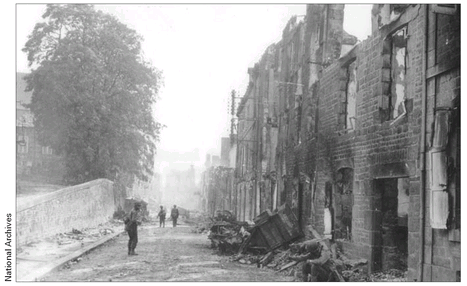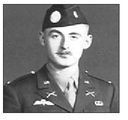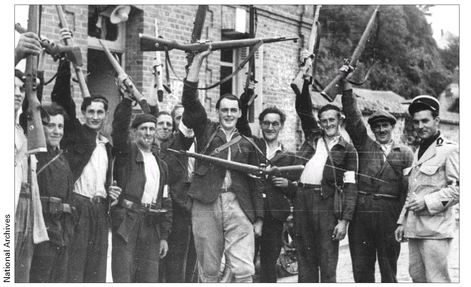War Stories III (36 page)
Authors: Oliver L. North

Â
U.S. troops walk through battered Mortain.

Patton's armor reached Argentan on 13 Augustâand held up as orderedâwaiting for Montgomery's 21st British/Canadian army to close the noose on the beleaguered columns of German Army Group B. Montgomery delayed long enough to bring up more artillery and pound the retreating Wehrmacht with air strikes, while Patton fumed as 40,000 Germans managed to slip through a six-mile-wide gap between the American and British lines.
On 15 August 1944 the 7th Allied Armyâthree U.S. divisions, four Free French, along with U.S. Rangers and Canadian commandosâstormed ashore in southern France on Operation Anvil. That afternoon, a furious Hitler, calling this “the worst day of my life,” fired von Kluge, replaced him with Walther Model, directed a retreat to the Seineâand ordered that Paris be held.
It was a flight of fancy. With more than 300,000 German soldiers trapped in the “Falaise Pocket,” the Wehrmacht in France was facing total annihilation. The once mighty Panzer columns had been reduced to fewer than 150 tanks. Tens of thousands of German wounded were being transported on anything with wheelsâmuch of it horse-drawn. And on 19 August, Patton reached the Seine, twenty-five miles northwest of Paris.
On 21 August, after three days of furious battle against the 12th SS-Hitler Youth Division, the 1st Polish Armored Divisionâone of the many expatriate units fighting under the British bannerâmanaged to close the bottleneck at Falaise. The carnage was horrific. More than 50,000 German troops lay dead and another 200,000 were taken prisonerâmost of them wounded or shell-shocked. While touring the battlefield on 23 August, Eisenhower remarked that, “It was literally possible to walk for hundreds of yards at a time, stepping on nothing but dead and decaying flesh.”
All that remained now was the liberation of Paris. Though Hitler had ordered the city held, the French countryside was now up in arms. In Paris, resistance factions that rarely cooperated with one another began an uprising against the German occupiers on 19 August. Many of the French resistance units had been armed, trained, and equipped by British SOE and American OSS intelligence officers like French-born Rene Defourneaux. Rene's parents had emigrated to the U.S. in 1939 to escape the menace of Nazism. Shortly before America entered the war, twenty-two-year-old Rene enlisted in the U.S. Army. He was subsequently recruited by the OSS to help train Resistance fighters.
RENE DEFOURNEAUX
Provence, France
19 August 1944
19 August 1944

I parachuted into France on the night of 8â9 August, 1944. My assignment was to link up with a French Resistance unit and carry out sabotage and “dirty tricks” against the Germans: blocking roads, blowing up bridges or destroying communication, knocking off railroads, and so on.
We did a lot of work in conjunction with the Air Force, because it's nice to have bombs going off to conceal the things we were blowing up. If you blow up a railroad switch or a telephone center and there is no other activity aroundâthe Germans very quickly figure out who's doing it. So we liked to coordinate our effort with the Air Force.
We did pretty well. Our biggest mission was to prevent two German Panzer divisions west of us from going after Patton and his southern flank. To stop them, we had to knock off bridges, cut their communication, and sabotage their fuel. The resistance guys I was sent to help were pretty good. We made life miserable for the Germans.
I had started out in the Army as a POW interrogator in England. But one day, an officer came into my office, closed the door, and asked, “Defourneaux, how would you like to go back to France before anybody else?”
I said, “Yeah? How do you propose to send me there?” He told me that they'd drop me from an airplane, and he gave me two minutes to make up my mind. So I said, “Okay, I'm game. I'll go.”
A few days later, I was in a castle, north of London. And there, they gave twenty-nine of us a series of testsâfor two or three days. Afterward, they called us in and said, “The nine of you, over hereâcome this way. The rest of you, leave by the other way.” So, they took nine out of twenty-nine of us.
All nine of us went to Scotland to learn guerilla warfare, dirty tricks, and all the “covert arts” for about two months. By the time we finished the Americans and British had just landed in Normandy. They told me, “We've got a job for you. You're going to join a Frenchman who has already been trainedâhis name is Leon. You will recognize him by a small scar on his lower lip. He's expecting you, so don't worry, everything's going to be fine.”
We were then sent to Eisenhower's headquarters in London and we were sworn in as 2nd lieutenants. Nobody ever told us about the bad things that could happen, and never mentioned any casualties. They had made a set of civilian clothing for each of us. Two tailors made us suits typical of the part of the country we were going to so that we could blend in.
After we finished our training, they informed us that, “since most of you will be dropped, you'd better learn to jump out of an airplane.” Well, I thought, jumping out of an airplane is something anybody can do. It's the landing that's trickyâso most of the training was how to land properly.
Then of course we complained about why we had only one parachute. We had heard that in America, you jump with a reserve chute. Their reply was, “We drop you so low, a reserve chute won't have time to open anyway, so one chance is all you're getting.”
The night of 8 August, I got aboard a B-24 and when we got over the part of France where I was supposed to jump, the “dispatcher”âthe guy who knows the missionâtells me to jump out of the hole where the belly turret was when the green light came on. So I did.
A few seconds later I was safely on the ground and a little while after I landed, two men from the resistance unit I was being sent to help met me with the proper recognition signal and took me to the local head of the Resistance. He had been with the Vichy secret police and he defected. He went from France to Spain to England, and was trained like I was, and sent back into France.
I started with this twelve-man unit, teaching them the basic fundamentals of guerilla warfare, making bombs, and how to help get downed airmen safely out of France. Within days I had fifty men with me. And within two months, I had a hundred. We were on our way.
The OSS didn't win the warâbut we helped. As the Allies broke out of Normandy, we helped the French resistance go after the Germansâdemoralizing themâand helping them to decide that they really didn't want to stay in France after the fall of Paris. Our work undoubtedly helped save the lives of a lot of American soldiers.
The uprisings in Paris and throughout the French countryside did indeed help the Germans decide that the French capital wasn't worth dying for. On 22 August, Hitler reiterated his order to hold the cityâor failing thatâto destroy it. But the broken army that straggled back into Paris from the disaster in Normandy had lost the will to fight. As Allied forces closed in on the French capitalâGerman soldiers were taking “French leave”âand heading home by whatever means possible. Nearly 100,000âmany of them woundedâdeserted the Wehrmacht in those last days of August, only to be rounded up when they arrived at the German frontier.
Â
Members of the French resistance celebrate.

Late on the evening of 23 August, the lead elements of the 2nd French Armored Division, commanded by General Phillippe Leclerc, entered Paris. The next day the remainder of the division fought their way, with the help of several resistance units, through the last German defenders. On August 25âeighty days after the landings at NormandyâCharles de Gaulle, who had made his own way to France without the help of the British or Americans, made a triumphal entry atop a Sherman tank carrying the French tri-color. Hitler's worst days were still to come.
CHAPTER 13
THE BATTLE OF THE BULGE 1944
B
erlin by ThanksgivingâHome by Christmas.
They were words none of Allied generals encouragedâbut after the liberation of Paris on 25 August, more than a few GIs expressed words like these. The once mighty Wehrmacht was on the run. Many American soldiersâand even some of the war-weary British in Montgomery's 21st Army Groupâthought the war might actually be over before the end of 1944. They had reason for such hope.
erlin by ThanksgivingâHome by Christmas.
They were words none of Allied generals encouragedâbut after the liberation of Paris on 25 August, more than a few GIs expressed words like these. The once mighty Wehrmacht was on the run. Many American soldiersâand even some of the war-weary British in Montgomery's 21st Army Groupâthought the war might actually be over before the end of 1944. They had reason for such hope.
The Red Army was closing in from the East. Germany's cities and means of production were being bombed around the clockâby the American 8th Air Force during the day and British Bomber Command at night in Operation Pointblank. By 4 September, the British and Canadians had liberated Brussels and Antwerp, Belgium. On 15 September, the U.S./Free French 6th Army Groupâhaving marched more than 350 miles from their AnvilDragoon landing beaches in southern Franceâlinked up with the right flank of Patton's 3rd Army at Epinal. With all of Belgium and Luxembourg liberated, the Allies had a continuous front from the English Channel to the Swiss border.
Between Normandy and Belgium, Hitler had lost 400,000 irreplaceable soldiers killed and captured, over 1,300 tanks, more than 2,000 artillery
pieces and assault guns, and 3,500 aircraft. But he wasn't about to give up. And the Allies had a major problem of their own making: supply.
pieces and assault guns, and 3,500 aircraft. But he wasn't about to give up. And the Allies had a major problem of their own making: supply.
Â
German soldiers mounting their last offensive in the Battle of the Bulge.

Though AntwerpâEurope's largest portâwas in Allied hands, the harbor and the forty-five-mile-long Schelde River estuary opening on the English Channel were heavily mined and the low-lying Dutch offshore islands guarding the approach were all still in German control. Until the mines and German troops were clearedâno Allied ships could enter the anchorageârequiring all ammunition, fuel, food, and other supplies to be trucked 400 miles from Normandy.
Montgomery believed that a quick breakthrough to the Ruhr River valleyâGermany's industrial heartlandâmight hasten the end of the war and negate the need for a bloody fight through the marshlands west of Antwerp. Eisenhower approved a two-part plan Monty dubbed Operation Market Garden. It called for the British 1st Airborneâalong with the U.S. 82nd and 101st Airborne Divisions designated as the 1st Allied Airborne
Armyâto launch a surprise airborne assault to seize key bridges over which the British Guards Armored Division would charge across the Rhine and into the west German plain. It was a disaster.
Armyâto launch a surprise airborne assault to seize key bridges over which the British Guards Armored Division would charge across the Rhine and into the west German plain. It was a disaster.
Other books
Man From Tennessee by Greene, Jennifer
A Deeper Shade of Bad by Price, Ella
Stage Fright (Bit Parts) by Scott, Michelle
Soul Rest: A Knights of the Board Room Novel by Hill, Joey W.
Keeper of the Stars by Robin Lee Hatcher
Little Book of Manchester United by Ian Welch
Green Velvet Murder: A Donut Hole Cozy Mystery - Book 16 by Susan Gillard
A Man to Remember by Engels, Mary Tate
The Finishing Touches by Browne, Hester
The Goblin Wood by Hilari Bell